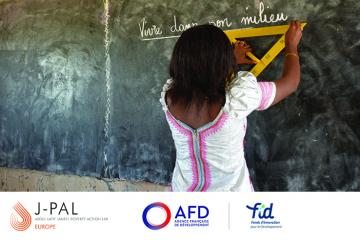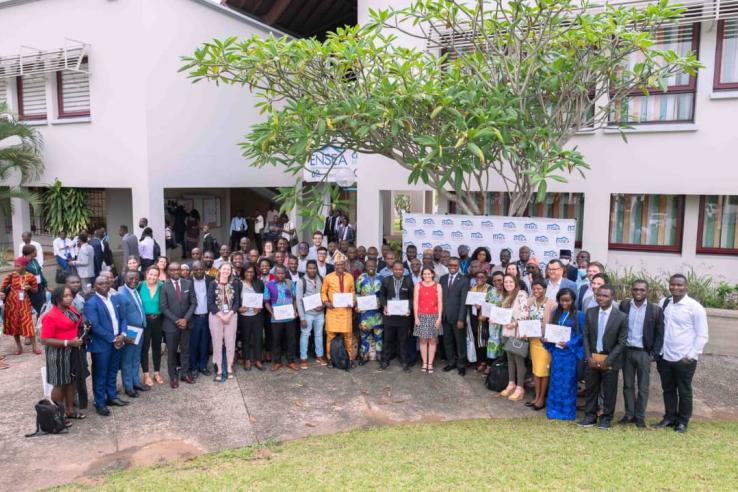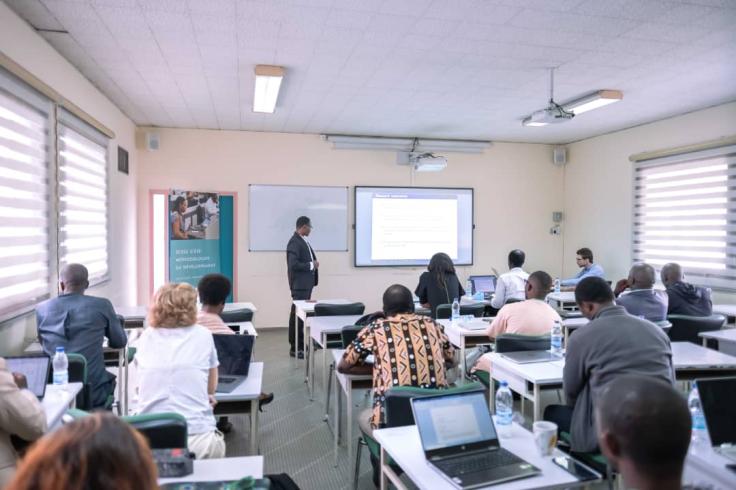
Strengthening development economics research in Africa: A recap of the “Development Methodologies” summer school

To support both the generation and application of new rigorous evidence in Africa, J-PAL partnered with the French Development Agency (AFD), the Fund for Innovation in Development (FID), and the École National Supérieure de Statistique et d’Économie Appliquée (ENSEA) in Abidjan to offer a summer school from 5-8 July for over seventy researchers and policymakers from seventeen countries across Africa. The course was part of a series of activities organized under the Development Methodologies Chair, held by J-PAL co-founders Abhijit Banerjee and Esther Duflo, at the Paris School of Economics with the aim of promoting research in development economics to inform development policy. This is the second summer school in the series, following the “Innovations for Development” course offered online in 2021.
Reinforcing capacities to conduct research in development economics
Local knowledge is a prerequisite for producing context-relevant research. But African researchers remain underrepresented in economics publications, despite increasing recognition that incorporating local researchers into development studies can enhance the policy impact of research and support the design of more inclusive social policies.
Capacity to generate evidence already exists among researchers in the region, but what can be done to harness it? In a previous blog post, J-PAL Africa colleagues outlined key barriers that are constraining the research production capacity of African scholars, including limited access to research funding, professional networks, and training. The summer school was designed to help alleviate some of these obstacles for the forty African researchers participating.
Training: A large focus of the summer school was methodology training sessions to better equip researchers to conduct randomised evaluations. Building on learnings from the 2021 edition of the summer school, the training was offered in both French and English as non-English speaking researchers are often unable to benefit from such capacity-building opportunities.
Funding: African scholars’ ability to access research funding is limited in comparison to their North American and European counterparts. Launched in 2019 to identify, test, and scale innovative development solutions in low and middle-income countries, the FID contributed to the summer school programme by organising office hours for participants interested in engaging with the fund. J-PAL Africa staff attending the summer school also highlighted other funding opportunities available through J-PAL’s various African Scholars Programs.
Networks: Limited professional networks can curtail the potential to advance for many researchers from the Global South; this is often particularly true for those who do not work in English. Over the course of the four days, participants were able to continuously engage with an experienced teaching team led by J-PAL affiliated professors and get feedback on their research. To further help expand participants’ professional networks, Innovations for Poverty Action (IPA)’s Francophone West Africa staff shared an overview of their ongoing efforts to increase the diversity of their research network. A Whatsapp group set up by participants will provide a forum for continuing exchange between participants beyond the event.

Photo: Noeïm Photographie
Evidence generation alone is not sufficient to bring about policy change; that is why the summer school also offered a parallel teaching track focused on the uptake and use of evidence in decision-making processes by policymakers. This track brought together over thirty policymakers representing 28 government bodies in Benin, Burkina Faso, Côte d’Ivoire, Morocco, Niger, and Togo.
The policy track highlighted practical examples of how rigorous evidence can guide the development of scalable interventions. Participants heard from Teaching at the Right Level (TaRL) Africa staff on the adaptation and scaling process of the TaRL approach across the continent. J-PAL Africa staff also contributed to this module with an overview of the Digital Identification and Finance Initiative, focusing on the partnership-building process with governments underlying this work.
Implementing an evidence-informed employment policy agenda
The summer school closed with a panel discussion highlighting efforts spearheaded by the Ivorian Directorate General of Employment (DGE) and the Office for the Coordination of Youth Employment Programs (BCP-Emploi) to operationalise an evidence-informed employment policy agenda.
Hermann Toualy, coordinator of BCP-Emploi, opened the session by sharing insights on various approaches for improving the employment prospects of young jobseekers. His presentation featured results from the impact of a dual apprenticeship program and a public works program, implemented as part of Côte d’Ivoire’s Youth Employment and Skills Development Project. Assi Kimoi, deputy director of the economic policy analysis unit of the Ivorian Centre for Economic and Social Research, followed to share insights from a randomised evaluation of a soft skills education intervention implemented as part of the government’s Civic Action Service for Employment and Development program. He was preceded by Mamadou Touré, director of the National Civic Service Office, who gave an overview of the office’s soft skills development activities, a key lever of the country’s national development plan. In the second section of the panel, Cyrille Gnalega, deputy director for Statistical Studies and Analysis at the DGE, discussed the goals of an Embedded Evidence Lab, being set up with technical assistance from IPA, to institutionalise a culture of evidence-based decision-making within the DGE.
Looking ahead
In her opening remarks, the Ivorian Minister of Planning and Development, Nialé Kaba, described the summer school as an opportunity to build and nurture links between the world of research and policymaking, as well as to promote a culture of evidence use across the African continent. While rigorous impact evaluations can be a potent tool for identifying effective solutions to development challenges, a conducive ecosystem is required for such research to inform policy. We look forward to fostering connections between policymakers and researchers, two key actors of this ecosystem, while building capacity to generate and use the results of rigorous evaluations.